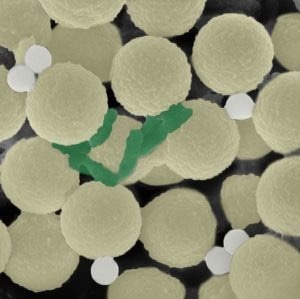Reviewed by Lexie CornerMay 9 2024
In a recent study published in the journal ACS Nano, researchers reported how swarms of microscale robots, or microrobots, collected microorganisms and plastic fragments from water. The bots were then cleaned and put to use again.
 To clean water, researchers have designed swarms of tiny, spherical robots (light yellow) that collect bacteria (green) and small pieces of plastic (gray). Image Credit: ACS Nano 2024.
To clean water, researchers have designed swarms of tiny, spherical robots (light yellow) that collect bacteria (green) and small pieces of plastic (gray). Image Credit: ACS Nano 2024.
Cleaning up outdated food packaging, abandoned kid's toys, and other poorly managed plastic garbage from rivers and oceans becomes harder when it degrades into microplastics. These microscopic pieces of plastic also draw bacteria, even pathogenic ones.
The minute size of microplastics, measuring 5 millimeters or less, introduces an additional layer to the plastic pollution issue. Animals can ingest these particles, posing potential harm and leading to their incorporation into the food chain, ultimately impacting humans. While the complete health implications for humans remain unclear, it is important to note that microplastics themselves are not the sole focus of concern.
These fragments draw pathogenic and other bacteria that can be consumed. Martin Pumera and colleagues used microscale robotic systems, which are made up of several tiny parts that cooperate to simultaneously remove plastic and bacteria from water. These systems mirror natural swarms, like schools of fish.
The researchers used magnetic microparticles, which can only move in the presence of a magnetic field, to connect positively charged polymer strands to create the robots. Microbes and plastics are drawn to the polymer strands that emanate from the beads' surface.
The completed items, or individual robots, had a diameter of 2.8 mm. The robots clustered together when they were subjected to a rotating magnetic field. The robots that self-organized into flat clusters could be changed in quantity, allowing the researchers to modify the swarm's movement and pace.
Pseudomonas aeruginosa, a bacteria that causes pneumonia and other diseases, was added to a water tank along with fluorescent polystyrene beads that were 1 µm wide. This allowed the scientists to reproduce microplastics and bacteria seen in the environment in laboratory settings.
The microrobots were then incorporated into the tank and subjected to a rotating magnetic field for half an hour, with 10-second intervals of on-and-off exposure. Approximately 80 % of the germs were collected by a robot concentration of 7.5 mg per mL, the densest of the four concentrations examined.
As the loose plastic beads were pulled to the microrobots, their quantity rapidly decreased at this constant concentration. The scientists then employed a permanent magnet to gather the robots and ultrasonic therapy to separate the germs attached to them.
They finished the cleaning by subjecting the eliminated microorganisms to UV light. The decontaminated robots continued to collect plastic and bacteria when they were utilized again, albeit in reduced quantities. The researchers point out that this micro-robotic system offers a potentially effective method for purging water from microorganisms and debris.
The authors received support from the European Regional Development Fund/European Social Fund project TECHSCALE and the REFRESH program of the European Union and CzechNanoLab.
Water-cleaning beads grab microplastics and bacteria | Headline Science
Video Credit: ACS Nano
Journal Reference:
Ussia, M., et al. (2024) Magnetic Microrobot Swarms with Polymeric Hands Catching Bacteria and Microplastics in Water. ACS Nano. doi.org/10.1021/acsnano.4c02115.